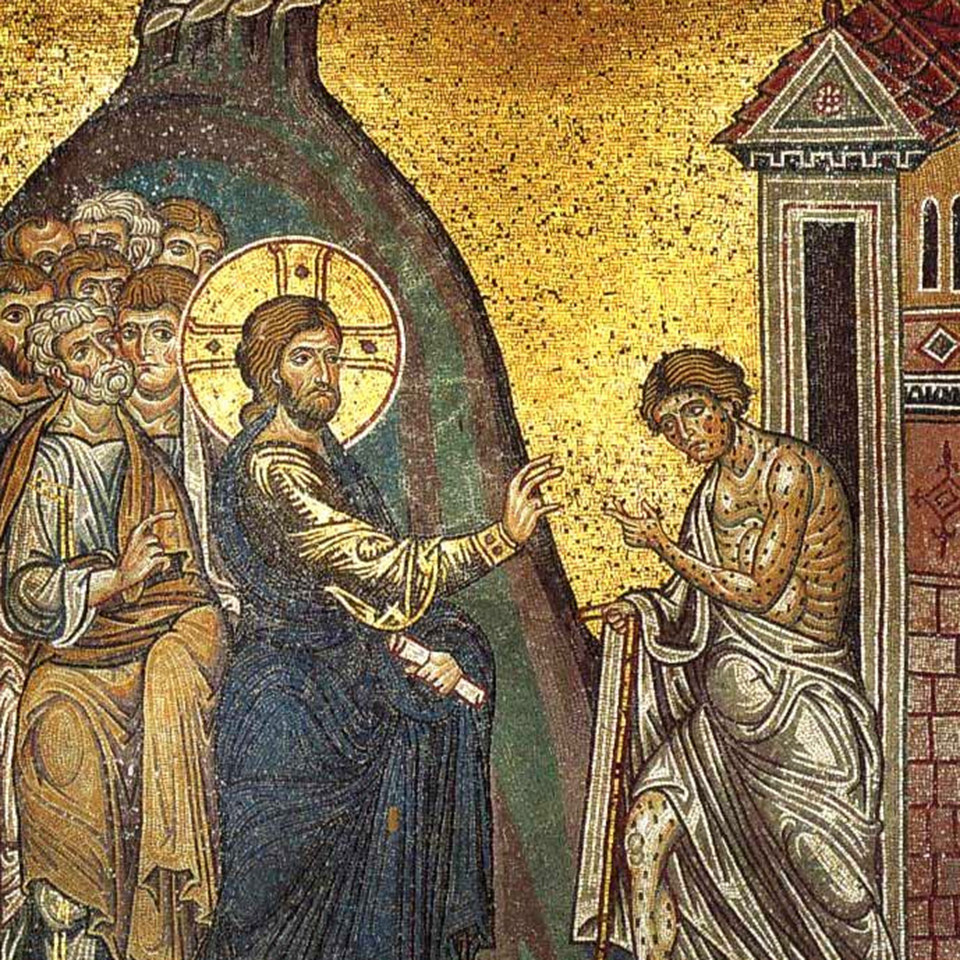A leper came to him and kneeling down begged him and said,
“If you wish, you can make me clean.”
Moved with pity, he stretched out his hand,
touched the leper, and said to him,
“I do will it. Be made clean.”
The leprosy left him immediately, and he was made clean.
Then, warning him sternly, he dismissed him at once.
Then he said to him, “See that you tell no one anything,
but go, show yourself to the priest
and offer for your cleansing what Moses prescribed;
that will be proof for them.”
The man went away and began to publicize the whole matter.
He spread the report abroad
so that it was impossible for Jesus to enter a town openly.
He remained outside in deserted places,
and people kept coming to him from everywhere. (Mark 1:40-45, emphasis added)
It never surprises me that the leper would ignore Christ’s suggestion for discretion and start telling everyone about the wonderful thing that has happened to them.
Such behavior seems wholly human, doesn’t it? Like the woman who sweeps the house to find a coin and then invites her neighbors to rejoice with her over it, his being healed from a disease that had rendered him unclean (and thus “unseen”) to his community was like becoming a found coin, and who wouldn’t get caught up in the excitement of such an occasion—“Look! I’m as shiny as a new coin!”—and forget the warning, even to stern warning, not to talk about it?
So, no, the behavior of the joyful leper, ready to kickstart his life and take his place in the larger society, should not surprise us, especially because it happens more than once in Scripture. In Matthew’s Gospel, we see a similar adjuration to the two blind men who are healed: “And their eyes were opened. Jesus warned them sternly, ‘See that no one knows about this’” (Matt. 9:29).
And guess what? Those two go off and blab about being healed. Because really, who wouldn’t?
And it happens yet again in the Gospel of Mark, when he heals a deaf man: “Jesus ordered them not to tell anyone. But the more he ordered them not to, the more they proclaimed it” (Mark 7:36). Imagine being the fellow who can finally speak plainly, and being told not to speak about something, especially something wonderful.
It strikes me that by asking the people he had healed (and those gathered in witness) not to talk about it—to offer no explanation for what had happened to them—Jesus was asking an awful lot of everyone, especially since he himself acknowledged, both in the story of the woman and the coin, and in the parable of the lost sheep (Luke 15:3-7), that when something great happens to us, it is natural to want to share the good news.
For that matter, Jesus himself acknowledged that keeping secrets is eventually a futile undertaking: “For there is nothing hidden that will not become visible, and nothing secret that will not be known and come to light” (Luke 8:17).
So . . . what’s with all the secrecy, then?
Perhaps today’s reading sheds some light on Jesus’ reticence. Even after being told to say nothing, the leper spread his report abroad, and it became impossible for Jesus to enter a town openly. He remained outside, in deserted places, and people kept coming to him from everywhere, further entrenching him in one spot.
We’ve read stories of lottery winners who find themselves besieged by long-lost friends and family members seeking to benefit from the windfall. Those they help often come back for more assistance—all expectation, with little appreciation.
The “lucky” winner begins to feel like little more than a walking ATM, his humanity undervalued, his personhood no longer seen by people who have become blind to everything but what he can provide, until the cash runs out.
Jesus’ healing gifts could never run out, but perhaps he was trying to prevent needy crowds from seeing him only as a means to an immediate end, devaluing his humanity and completely missing his divinity and his message. Such behavior kept Jesus from entering “a town openly,” and he “remained outside” (Mark 1:45).
Urging people to tell no one was a futile wish on Jesus’ part. He knew humanity too well to count on it. All he wanted, though, was to be able to walk openly among the people he meant to redeem, and to not be forced to remain outside, away from us.
But perhaps the more important point is this: the need for secrecy is past. Let us bring Jesus openly into our cities and towns and families, telling what he has done for us.
